Yorkshire
Traveller

Captain
James Cook, R.N.
Grace
and James Cook had eight
children.
Four died in childhood.
Only the second son
James and his sisters
Margaret and Christiana
survived.
Cook's family moved
from Marton, near Middlesbrough,
in 1736 when he was
eight and he spent most
of
his childhood in Great
Ayton.
His school, now a museum,
stands at the eastern
end of the High Street
facing a waterfall.
The family cottage was
dismantled and shipped
to
Australia in 1934, but
a monument marksit's
site
in
Bridge
Street
.
Easby
moor, south-east of
the village,
is crowned by a 51 foot
monument to Captain
Cook.
Cook's
sisters, Margaret married
a man named Fleck of
Redcar, and Christiana
married a fisherman
named Cocker of Staithes,
where her father James
lived with them.
Young
James Cook worked as
a farm labourer like
his
Father and then as an
apprentice to a grocer
in Staithes.
However, at the age
of 18 he found employment
in colliers
sailing out of Whitby,
shipping coals from
the River Tyne to London.
The
Captain Cook Birthplace
Museum is located within
Stewart Park at Marton,
the Museum stands near
to the site
at Marton, the Museum
stands near to the site
of the cottage where
Cook was born.
At
Marske-by-sea, the tower
of St. Germains Church
overlooks the grave
of James Cook senior.
Mrs Grace Cook is buried
with her five other
children
at Great Ayton, near
Middlesbrough.
In
Stockton-on-Tees Parish
Church there is a memorial
to
Captain James Cook and
an altarpiece made of
wood
from the Resolution,
one of Captain Cook's
ships.
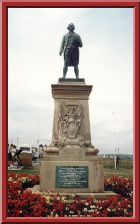
Captain
Cooks Monument, Whitby

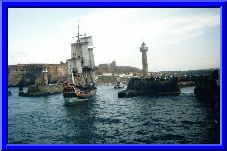
HM
BARK
"ENDEAVOUR"
A
replica of Captain Cooks
ship HM ENDEAVOUR received
a
fantastic welcome from
thousands of people
as
she sailed into Whitby
Harbour on Friday 9th
May 1997
after sailing from Australia.
Escorted by the Whitby
Lifeboat the Endeavour
arrived
at it's "home" port
where the original ship
was built.
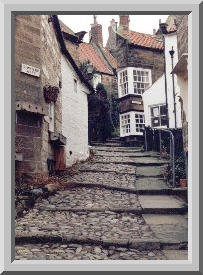
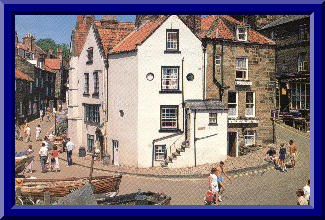
High
Street, Robin Hoods
Bay.
Robin
Hood's Bay a quiet,
charming seaside village,
belies it's smuggling
past.
At it's peak in the
eighteenth century,
the entire
population of Robin
Hood's Bay, Staithes,
Saltburn and
Runswick was thought
to be involved in the
smuggling of silk, brandy,
gin, tobacco, tea, coffee,
playing cards
chocolate, snuff and
linen.
It
is said of the picturesque
huddle of cottages that
it was once possible
to pass a bale of silk
from house
to house the length
of the village without
going outside
One can well believe
it.
This
delightful village lies
at the foot of a steep
hill and is an
absolute rabbit-warren
of tiny streets and
passageways
which you can wander
around for hours, all
well preserved.
The Bay itself provides
a lovely walk, and there's
a couple
of good pubs near the
top of the slipway.
There's practically
no parking in the village
itself,
and visitors have to
park at the top of the
hill and walk down (and
back up again, more
to the point)
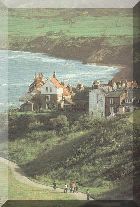
Robin
Hoods Bay
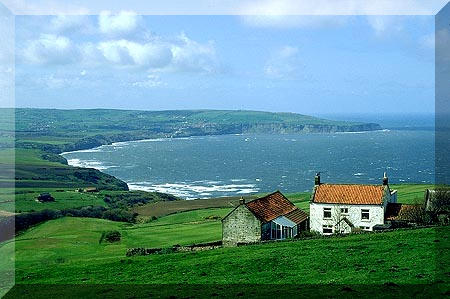
Ravenscar,
looking towards Robin
Hoods Bay.
photograph
reproduced by kind permission
of DaveLawrance:
dave@contact.demon.co.uk
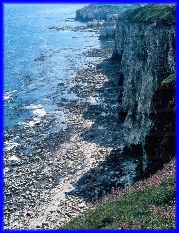
Bempton
Cliffs.
Further
south we arrive at the
sea bird breeding grounds
of
Bempton - the largest
in the country with
around
200,000 birds nesting
precariously on and
in the cliff face.
The effects of wind
and sea on the three
miles (5 km)
of chalk cliffs have
been to leave thousands
of little
pockets in the near
vertical face.
In these nest Britain's
only gannets as well
as
fulmars, kittiwakes,
cormorants and many
types of gull.
Well worth a visit unless
you are seeking peace
and quiet!
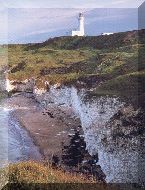
Flamborough
Head Lighthouse and
Bay.
Flamborough
Head sticks out into
the North Sea a short
way from Bempton with
the lighthouse shown
here
standing a prudent distance
from the cliff edge.
Flamborough suffered
in the past from marauding
Vikings,
being sacked seven times
over the centuries.
But eventually they
decided to make themselves
at
home here in whatever
was left after their
depredations,
and many of the local
people are their descendants.
Now
let's continue and visit
the Yorkshire coastline...

